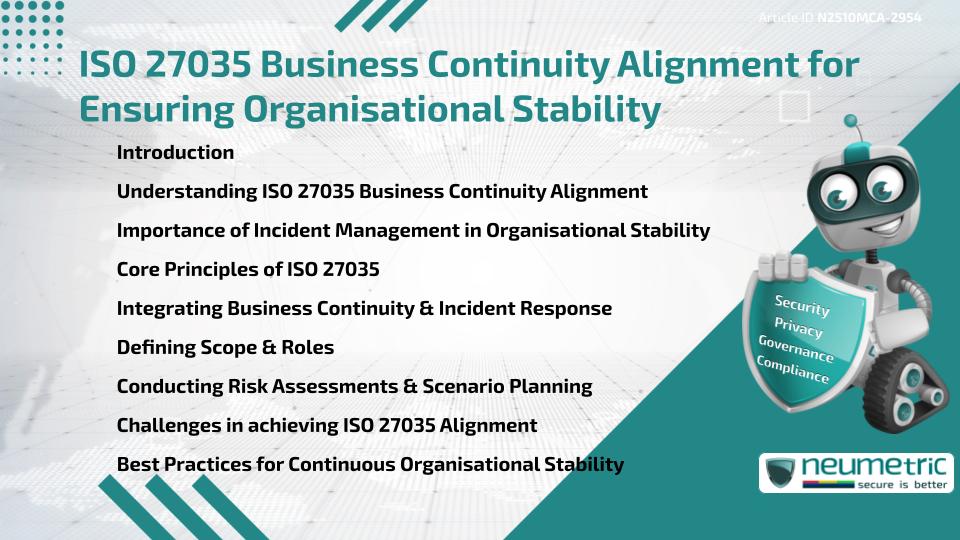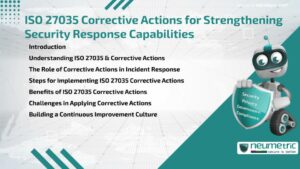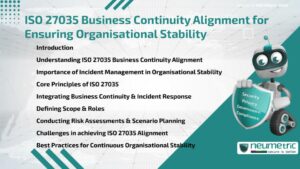Table of Contents
ToggleIntroduction
The ISO 27035 Business Continuity alignment plays a critical role in ensuring organisational stability by integrating Incident Management with Business Continuity Planning [BCP]. ISO 27035 provides a Framework for managing Information Security Incidents effectively, ensuring swift recovery & sustained operations. This article explains how aligning ISO 27035 with Business Continuity principles enhances resilience, compliance & long-term stability.
Understanding ISO 27035 Business Continuity Alignment
ISO 27035 is the international Standard for Information Security Incident Management. The ISO 27035 Business Continuity alignment ensures that Incident Response activities are closely integrated with Business Continuity & Disaster Recovery Frameworks. This coordination allows organisations to manage disruptions efficiently, limit damage & maintain essential services.
Importance of Incident Management in Organisational Stability
Incident Management is not only about detection & response-it is about maintaining stability during unforeseen events. The ISO 27035 Business Continuity alignment ensures that Security Incidents are managed systematically, reducing downtime & Financial impact. It supports the organisation’s ability to recover operations while protecting Critical Assets, Systems & Data.
Core Principles of ISO 27035
Key principles of the ISO 27035 Business Continuity alignment include:
- Preparation: Establishing Policies, roles & responsibilities
- Detection & Reporting: Identifying & documenting incidents
- Assessment & Response: Classifying incidents based on impact
- Learning & Improvement: Conducting post-incident reviews
These principles align with ISO 22301 & ISO 27001 Frameworks for comprehensive resilience.
Integrating Business Continuity & Incident Response
Business Continuity ensures that essential services continue during & after an incident. Integrating it with ISO 27035 Incident Management ensures that:
- Response teams coordinate actions across departments
- Communication plans are activated during incidents
- Recovery Time Objectives [RTO] and Recovery Point Objectives [RPO] are met
- Lessons learned feed back into the Business Continuity Plan
This alignment strengthens the organisation’s overall preparedness.
Defining Scope & Roles
To achieve effective ISO 27035 Business Continuity alignment, organisations must define the scope of Incident Management & assign roles clearly. Incident Response Teams, Business Continuity Managers & IT Security personnel must collaborate to ensure an integrated & efficient approach.
Conducting Risk Assessments & Scenario Planning
Organisations must conduct Risk Assessments to identify Potential Threats & Vulnerabilities that could disrupt operations. Scenario Planning helps anticipate incidents such as data breaches, system failures or natural disasters. Testing these scenarios validates the readiness of Incident Response & Continuity Plans.
Challenges in achieving ISO 27035 Alignment
Common challenges include:
- Lack of coordination between security & continuity teams
- Limited awareness of ISO 27035 principles
- Resource Constraints for smaller enterprises
Addressing these challenges requires leadership support, training & Continuous Improvement.
Best Practices for Continuous Organisational Stability
To maintain strong ISO 27035 Business Continuity alignment, organisations should:
- Establish integrated Policies combining Incident Management & Business Continuity
- Conduct regular drills & tabletop exercises
- Maintain communication channels for quick coordination
- Review & update incident procedures periodically
- Hold Management Review Meetings to assess effectiveness
Takeaways
- ISO 27035 integrates Incident Management with Business Continuity for resilience
- Defined roles & regular testing ensure effective response & recovery
- Scenario Planning enhances preparedness for operational disruptions
- Continuous review supports compliance & organisational stability
- Alignment builds trust with Clients & Partners through proven resilience
FAQ
What is ISO 27035 Business Continuity alignment?
It is the integration of ISO 27035 Incident Management with Business Continuity Planning to ensure stability during incidents.
Why is ISO 27035 Business Continuity alignment important?
It strengthens organisational resilience, reduces downtime & ensures operational recovery after incidents.
What Standards complement ISO 27035 Business Continuity alignment?
ISO 22301 for Business Continuity & ISO 27001 for Information Security complement ISO 27035.
Who is responsible for implementing ISO 27035 Business Continuity alignment?
Incident Response Teams, Business Continuity Managers & IT Security leaders share responsibility.
How can organisations test ISO 27035 Business Continuity alignment?
Through drills, simulations & post-incident reviews that validate response & recovery capabilities.
What challenges exist in achieving ISO 27035 Business Continuity alignment?
Challenges include poor coordination, lack of training & limited resources.
How does ISO 27035 Business Continuity alignment improve stability?
It ensures that incidents are managed systematically & recovery is swift, minimising business disruption.
Need help for Security, Privacy, Governance & VAPT?
Neumetric provides organisations the necessary help to achieve their Cybersecurity, Compliance, Governance, Privacy, Certifications & Pentesting needs.
Organisations & Businesses, specifically those which provide SaaS & AI Solutions in the Fintech, BFSI & other regulated sectors, usually need a Cybersecurity Partner for meeting & maintaining the ongoing Security & Privacy needs & requirements of their Enterprise Clients & Privacy conscious Customers.
SOC 2, ISO 27001, ISO 42001, NIST, HIPAA, HECVAT, EU GDPR are some of the Frameworks that are served by Fusion – a SaaS, multimodular, multitenant, centralised, automated, Cybersecurity & Compliance Management system.
Neumetric also provides Expert Services for technical security which covers VAPT for Web Applications, APIs, iOS & Android Mobile Apps, Security Testing for AWS & other Cloud Environments & Cloud Infrastructure & other similar scopes.
Reach out to us by Email or filling out the Contact Form…





